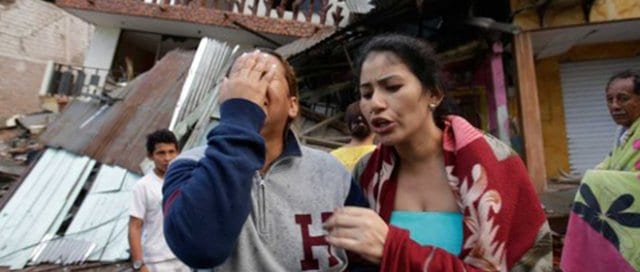We will send our first shipment of aid tomorrow to those people most affected from the 7.8 earthquake that struck Ecuador last Saturday. The first two-ton load of aid to secure basic hygiene and clean water among affected communities will leave from Spain.

We will send our first shipment of aid tomorrow to those people most affected from the 7.8 earthquake that struck Ecuador last Saturday.
Oxfam has already deployed a 7-person team consisting of water, sanitation and hygiene experts, as well as logisticians, to determine the most effective way to mount its humanitarian response. Oxfam will send its first two-ton load of aid to secure basic hygiene and clean water among affected communities. The aid is part of a multi-agency airlift coordinated via the Spanish government, scheduled to leave from Madrid tomorrow.
“We have been in touch with the Ecuadorian Red Cross and other national organisations. They all agree that the most urgent need is for safe drinking water and storage, as well as shelter for thousands who have lost their homes,” said Enrique García, Oxfam humanitarian coordinator for Latin America and the Caribbean.
Oxfam is working with the Red Cross to coordinate a response centred around water, sanitation and hygiene. This is important in order to avoid the threat of water-borne sickness.
“Our main purpose now is to get to the people who are most vulnerable to worsening health conditions, because sanitation services have been badly affected and in some cases destroyed. We will also promote preventive measures to help people avoid diarrhoea and other vector transmitted diseases,” Garcia said.
The UN Office for the Coordination of Humanitarian Affairs (OCHA) expects at least one million people to be affected by the earthquake.
Oxfam has worked for more than 30 years in Ecuador improving the life conditions and livelihoods of small farmers, and also raising awareness of women rights and violence against women. Oxfam has previously responded to other emergencies in the country, including helping people after the Tungurahua volcano eruption in 2008 and severe floods during that same year.





